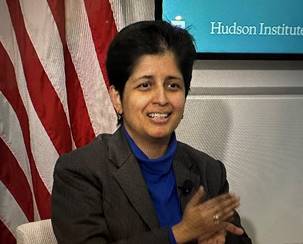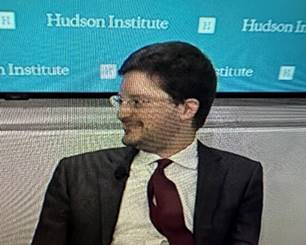
Aparna Pande

Aparna Pande Jonathan Ward

Daniel Markey
Hudson Institute Contemplates Future US Relations with China & India
By Elaine Pasquini

Washington: The Hudson Institute hosted a panel discussion at their headquarters on December 10, 2024, to consider possible changes in Washington’s relationship with India and China in the coming new year in view of the change in administration at the White House. Aparna Pande, director of the Hudson Institute’s India program, moderated the one-hour program.
“In 2025, the new administration in Washington will need to address the US relationship with China and India, the world’s two most populous nations who are also nuclear-armed neighbors with two of the fastest growing economies,” Pande said in opening remarks. “In the backdrop of deepening US-China competition and rivalry, India’s rise as an economic and security partner…presents opportunities for American grand strategy.”
Hudson Institute senior fellow Jonathan Ward noted the United States’ interest in China had changed over the past eight years from one of engagement into competition. The US, according to Ward, is just beginning to respond to China’s economic, diplomatic, and military challenges. Referring to Chinese efforts to “anchor itself to all economic activity…we need to win that battle in order to have the fundamentals that allow us to prevail in the later decades.”
India, as the world’s fifth-largest economy with a population of over 1.4 billion people, “presents real-world commercial opportunities that allow American businesses to anchor there as they exit China,” Ward said. “As we have a post-China moment, we have to take a very renewed focus on India. That could be a big piece of how we ultimately succeed.”
As the centerpiece of the world economy, the US still must “win the economic competition in terms of trade, high tech, strategic industries, and capital markets,” Ward said. “We can establish that very firmly for the decades ahead if we can execute a strategy of economic containment with China.”
As to the China-India relationship, it is still characterized by hostility and recent violence on their shared border and the legacy of the 1962 China-India border war.
“I think China is trying to stabilize what they can in order to focus on what is coming with the US,” Ward observed, referring to President-elect Donald Trump’s talk of tariffs against China, thus lowering China’s concerns about its border with India.
Daniel Markey, senior advisor on South Asia at the United States Institute of Peace, expressed his view that both India and China “sense that there are diminishing rewards with respect to heightened tensions along their shared border,” but they will continue with their competition in other ways. India will probably go back to the strategy of levering what it can get out of China to build its own economy while tamping down some of the most obvious tensions in the relationship, he added.
While stating he did not want to make predictions, Markey put forth that the border situation between China and India would remain calm for the next year. Beijing, he said, wants to “smooth things over with India along the border…and I think they are going to really want to feel out this new administration in Washington.”
“I feel that they have their hands full with that and so they don’t want to have an unnecessary complicating factor which is also difficult to predict,” Markey said. “This is not going to go away but I would say we are on a bit of a pause.”
Markey also commented that he was confounded by the Biden administration’s emphasis on India. “This was an administration that was really zealous in its pursuit of a closer relationship with India,” he stated, and any problems or differences were “diplomatically contained.” One reason for this, he opined, was that it would “be helpful to the United States in our competition with China.”
The incoming Trump administration’s focus on trade and tariffs, and, specifically, higher tariff barriers to Chinese products, “will continue to create opportunities for India to fill certain gaps,” Markey noted. “There is a clear enthusiasm in the incoming Trump team…for India, so we expect a lot of positive rhetoric and diplomacy and open doors and a desire to make deals with India.”
Now, the question for the next four years is “whether that particular convergence of eagerness on the part of Washington and India’s concerns about China, will persist,” he said. “My best guess is that we are going to see at least some kind of a shift in terms of Washington’s strategic logic and policy emphasis but that the broad attraction of the US-India relationship and the broad concerns about China will persist.”
(Elaine Pasquini is a freelance journalist. Her reports appear in the Washington Report on Middle East Affairs and Nuze.Ink.)

